 Secretary of State Jon Husted (R) has apologized to a U.S. District Court judge who ruled against him last week, after the Secretary appeared to have tried to undermine the court's ruling, pending an appeal by the U.S. Sixth Circuit Court of Appeals. The apology came in a motion today, after Husted was ordered by the judge to personally appear for a hearing next week.
Secretary of State Jon Husted (R) has apologized to a U.S. District Court judge who ruled against him last week, after the Secretary appeared to have tried to undermine the court's ruling, pending an appeal by the U.S. Sixth Circuit Court of Appeals. The apology came in a motion today, after Husted was ordered by the judge to personally appear for a hearing next week.
As we reported last Friday, U.S. District Judge Peter Economus ruled in favor of a lawsuit filed by the Obama campaign and the Democratic Party, finding that Ohio's restriction on Early Voting in the final three days before the election --- for all but active-duty military --- was a violation of the U.S. Constitution's Equal Protection Clause.
In his ruling [PDF], Economus ordered the Secretary of State to restore Early Voting "on the three days immediately preceding Election Day for all eligible voters," just as it had been successfully implemented during the 2008 election, as the previous Sec. of State Jennifer Brunner, a Democrat, described to us during a recent interview. At the same time, the judge had also instructed the Buckeye State's current Secretary to "direct all Ohio elections boards to maintain a specific, consistent schedule on those three days, in keeping with [Husted's] earlier directive that only by doing so can he ensure that Ohio's election process is 'uniform, accessible for all, fair, and secure.'"
In response, rather than issuing a directive with uniform hours for voting in those three days before the November Presidential election, Husted issued a Directive on Tuesday notifying the state's 88 county Boards of Election that they should not establish hours for voting in those days, as the state was filing an appeal in the case.
"Announcing new hours before the court case reaches final resolution will only serve to confuse voters and conflict with the standard of uniformity," Husted wrote in the Directive, adding, "I am confident there will be sufficient time after the conclusion of the appeal process to set uniform hours across the state."
This afternoon, after being summoned to court in response to that Directive, Husted rescinded it and the state filed a motion [PDF] apologizing for what was interpreted as him having attempted to place his own personal stay on Economus' order. "The Secretary apologizes to the federal district court for creating that misimpression and has rescinded [the] Directive," the state writes in the motion, which seeks an official stay on the ruling, pending the Sixth Circuit's expedited appeal...
"The Secretary's intention was not to create a stay of this Court's order as Plaintiffs have suggested," today's motion reads. "The Court did not establish a date certain by which the Secretary must establish a uniform schedule, and the three days in question were still nearly two months away, the Secretary believed this was a reasonable and responsible course of action that was consistent with the Order."
"The Secretary would never intentionally contravene an order issued by the federal district court or any other court-and this case is no exception. Therefore, the Secretary has today rescinded Directive 2012-40."
As we original detailed when this story emerged some weeks ago, the Mitt Romney campaign --- based on a false article written by Mike Flynn at the late Andrew Breitbart's pretend website, which was subsequently echoed by Fox "News" --- had inaccurately claimed that the lawsuit by Obama and the Democrats was attempting to restrict Early Voting by the military. The Romney camp had dishonestly posited that the Obama campaign was attempting to "undermine" and restrict voting rights of the military, which the GOP nominee described on his Facebook page as an "outrage".
In fact, as the very first paragraph of the Obama complaint [PDF] made very clear, they had sought to open voting for all Ohioans, rather than restrict voting for any.
Despite the misleading charges and last week's ruling in favor of the Democrats, Romney's August 4th Facebook posting has yet to be amended or retracted.
As to the original Breitbart article by their Editor-in-Chief Flynn, including the phony claims that the Obama "campaign and the Democrat [sic] party" were "suing to restrict" the ability of the military "to vote in the upcoming election," that August 2nd article also remains unchanged, unamended, uncorrected and unredacted, despite it's entirely false premise and Flynn's closing charge: "Make no mistake, the Democrat lawsuit is intended to disenfranchise some unknown number of military voters."
When The BRAD BLOG asked Flynn earlier this week why he had yet to correct or retract his completely inaccurate article in the face of the federal court's ruling that Obama was correct and voting in the three days before the election should be opened to all, Flynn responded, also inaccurately, that "this isn't that case."
As usual, he was wrong.
"And," he added, also inaccurately, while referring to us, ironically enough, as a "hack" in the bargain, "I doubt you've ever corrected anything."
As to the real case at hand in Ohio and the fight for voting rights for all there, UC Irvine election law professor and blogger Rick Hasen describes the question of whether Judge Economus should agree to Husted's motion for a stay, pending the appeal, as "a tough call."
"On the one hand," he writes, "it seems that Husted should be getting the ball in motion to have the counties set uniform early voting hours for those last three days in Ohio in the event this judge's decision is upheld on appeal. On the other hand, there is something to the idea that setting hours and then rescinding them could cause confusion-especially if voters rely upon announced early voting that is later then taken away by the Sixth Circuit. (The chances of an eventual reversal from the Sixth Circuit appear fairly good to me-meaning these early voting hours will again disappear.) It seems some kind of order which allows for contingency plans to be put in place makes the most sense."
As we noted when reporting on Economus' initial ruling against Husted last Friday, Ian Millhiser of Think Progress suggested, as Hasen does today, that the Sixth Circuit court of Appeals may well reverse the lower court's ruling.
Millhiser notes that the Sixth Circuit is a "Republican-leaning court with a history of legally-challenged partisan decisions benefiting the Republican Party. So it remains to be seen whether Economus' decision will have staying power."
In 2005, after the disastrous 2004 Presidential Election as overseen by Brunner's predecessor, then Republican Sec. of State J. Kenneth Blackwell (who also served as co-chair for the Bush/Cheney re-election campaign), Early Voting was instituted in response to Election Day lines to vote that stretched anywhere from 2 to 12 hours, almost entirely in predominantly Democratic-leaning districts.
As Brunner recently explained to us, the addition of Early Voting was a tremendous success in 2008, when no lawsuits were filed, to her surprise, to keep precincts open later to accommodate an even larger turnout than in 2004. In 2008, as revealed during the recent trial in the Obama case, some 100,000, largely Democratic-leaning voters cast their votes in the final three days before the Tuesday election.
Moreover, Brunner chalked up the smoother Election Day processes in 2008, in no small part, to the addition of Early Voting in the month before the election. Since taking office in 2010, Ohio. Sec. of State Husted, along with state Republican legislators and Gov. John Kasich, have been attempting to drastically restrict those hours.
That, despite (or, arguably, because) Early Absentee voting numbers doubled between 2004 and 2008 after the expansion of voting hours. It should also be noted that Early Voting in the days before Election Day remained an option for Ohio voters throughout the primary season this year.
Brunner described the Republican attempt to restrict Early Voting in the general election, particularly during weekend hours, as "clearly aimed at 'Souls to the Polls'," the effort by African-American churches to encourage their congregations to get out and vote on the Sunday before the election.



 A Pretty Weak 'Strongman': 'BradCast' 10/30/25
A Pretty Weak 'Strongman': 'BradCast' 10/30/25 'Green News Report' 10/30/25
'Green News Report' 10/30/25
 Proposal for 'First Politically Viable Wealth Tax' Takes Shape in CA: 'BradCast' 10/29/25
Proposal for 'First Politically Viable Wealth Tax' Takes Shape in CA: 'BradCast' 10/29/25 Monster Storm, Endless Wars, Gamed Elections:
Monster Storm, Endless Wars, Gamed Elections: 'Green News Report' 10/28/25
'Green News Report' 10/28/25 Let's Play 'Who Wants
Let's Play 'Who Wants Sunday 'Cartoonists Dilemma' Toons
Sunday 'Cartoonists Dilemma' Toons Exiled NOAA Scientists Resurrect Critical Disaster Database: 'BradCast' 10/23/25
Exiled NOAA Scientists Resurrect Critical Disaster Database: 'BradCast' 10/23/25  'Green News Report' 10/23/25
'Green News Report' 10/23/25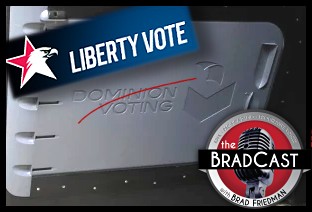 Trump-Allied GOP Partisan Buys Dominion Voting Systems: 'BradCast' 10/22/25
Trump-Allied GOP Partisan Buys Dominion Voting Systems: 'BradCast' 10/22/25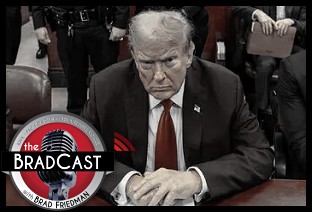 Trump, Republican Law(lessness) & (Dis)Order: 'BradCast' 10/21/25
Trump, Republican Law(lessness) & (Dis)Order: 'BradCast' 10/21/25 'Green News Report' 10/21/25
'Green News Report' 10/21/25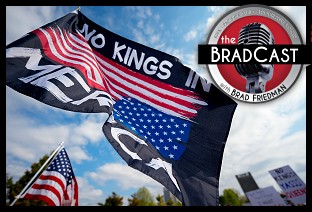 Celebrating 'No Kings': 'BradCast' 10/20/25
Celebrating 'No Kings': 'BradCast' 10/20/25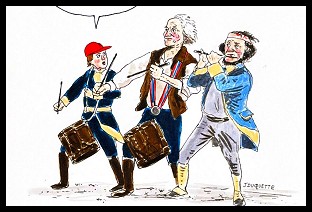 Sunday 'How It Started' Toons
Sunday 'How It Started' Toons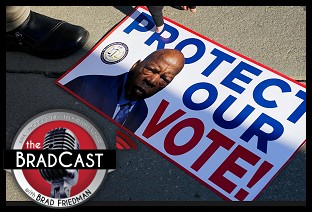 SCOTUS Repubs Appear Ready to Gut Rest of Voting Rights Act: 'BradCast' 10/16/25
SCOTUS Repubs Appear Ready to Gut Rest of Voting Rights Act: 'BradCast' 10/16/25 'Green News Report' 10/16/25
'Green News Report' 10/16/25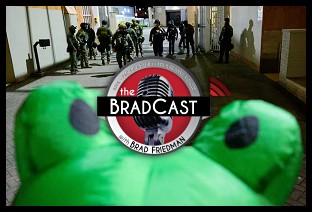 The 'Epstein Shutdown' and Other Autocratic Nightmares: 'BradCast' 10/15/25
The 'Epstein Shutdown' and Other Autocratic Nightmares: 'BradCast' 10/15/25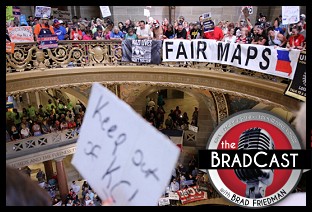 Group Vows to Block MO's GOP U.S. House Gerrymander: 'BradCast' 10/14/25
Group Vows to Block MO's GOP U.S. House Gerrymander: 'BradCast' 10/14/25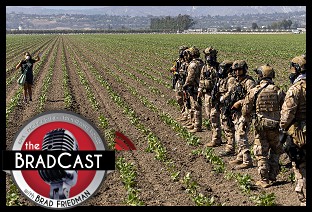 Trump Labor Dept. Warns Trump Policies Sparking Food Crisis: 'BradCast' 10/9/25
Trump Labor Dept. Warns Trump Policies Sparking Food Crisis: 'BradCast' 10/9/25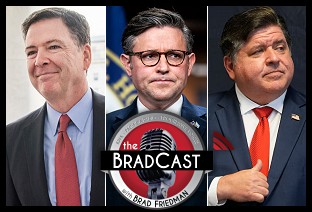 Trump's Losing Battles: 'BradCast' 10/8/25
Trump's Losing Battles: 'BradCast' 10/8/25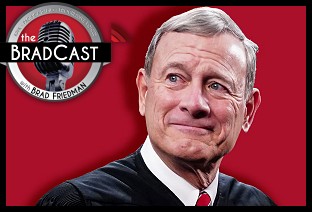 Trump, Roberts and His Stacked, Packed and Captured SCOTUS: 'BradCast' 10/7/25
Trump, Roberts and His Stacked, Packed and Captured SCOTUS: 'BradCast' 10/7/25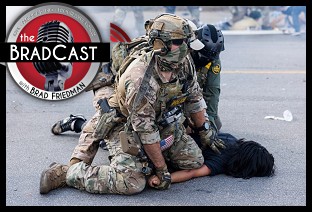 Trump Attempting His 'Invasion from Within': 'BradCast' 10/6/25
Trump Attempting His 'Invasion from Within': 'BradCast' 10/6/25 Biden Budget Expert: Mass Firings in Shutdown 'Illegal': 'BradCast' 10/2/25
Biden Budget Expert: Mass Firings in Shutdown 'Illegal': 'BradCast' 10/2/25 Why is DOJ Suing 'Blue' States for Their Voter Databases?: 'BradCast' 10/1/25
Why is DOJ Suing 'Blue' States for Their Voter Databases?: 'BradCast' 10/1/25
 VA GOP VOTER REG FRAUDSTER OFF HOOK
VA GOP VOTER REG FRAUDSTER OFF HOOK Criminal GOP Voter Registration Fraud Probe Expanding in VA
Criminal GOP Voter Registration Fraud Probe Expanding in VA DOJ PROBE SOUGHT AFTER VA ARREST
DOJ PROBE SOUGHT AFTER VA ARREST Arrest in VA: GOP Voter Reg Scandal Widens
Arrest in VA: GOP Voter Reg Scandal Widens ALL TOGETHER: ROVE, SPROUL, KOCHS, RNC
ALL TOGETHER: ROVE, SPROUL, KOCHS, RNC LATimes: RNC's 'Fired' Sproul Working for Repubs in 'as Many as 30 States'
LATimes: RNC's 'Fired' Sproul Working for Repubs in 'as Many as 30 States' 'Fired' Sproul Group 'Cloned', Still Working for Republicans in At Least 10 States
'Fired' Sproul Group 'Cloned', Still Working for Republicans in At Least 10 States FINALLY: FOX ON GOP REG FRAUD SCANDAL
FINALLY: FOX ON GOP REG FRAUD SCANDAL COLORADO FOLLOWS FLORIDA WITH GOP CRIMINAL INVESTIGATION
COLORADO FOLLOWS FLORIDA WITH GOP CRIMINAL INVESTIGATION CRIMINAL PROBE LAUNCHED INTO GOP VOTER REGISTRATION FRAUD SCANDAL IN FL
CRIMINAL PROBE LAUNCHED INTO GOP VOTER REGISTRATION FRAUD SCANDAL IN FL Brad Breaks PA Photo ID & GOP Registration Fraud Scandal News on Hartmann TV
Brad Breaks PA Photo ID & GOP Registration Fraud Scandal News on Hartmann TV  CAUGHT ON TAPE: COORDINATED NATIONWIDE GOP VOTER REG SCAM
CAUGHT ON TAPE: COORDINATED NATIONWIDE GOP VOTER REG SCAM CRIMINAL ELECTION FRAUD COMPLAINT FILED AGAINST GOP 'FRAUD' FIRM
CRIMINAL ELECTION FRAUD COMPLAINT FILED AGAINST GOP 'FRAUD' FIRM RICK SCOTT GETS ROLLED IN GOP REGISTRATION FRAUD SCANDAL
RICK SCOTT GETS ROLLED IN GOP REGISTRATION FRAUD SCANDAL VIDEO: Brad Breaks GOP Reg Fraud Scandal on Hartmann TV
VIDEO: Brad Breaks GOP Reg Fraud Scandal on Hartmann TV RNC FIRES NATIONAL VOTER REGISTRATION FIRM FOR FRAUD
RNC FIRES NATIONAL VOTER REGISTRATION FIRM FOR FRAUD EXCLUSIVE: Intvw w/ FL Official Who First Discovered GOP Reg Fraud
EXCLUSIVE: Intvw w/ FL Official Who First Discovered GOP Reg Fraud GOP REGISTRATION FRAUD FOUND IN FL
GOP REGISTRATION FRAUD FOUND IN FL

































